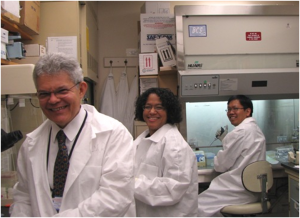Research
The Research Mission: From Bench to Bedside
Basic, translational, clinical, and epidemiologic investigations are vital activities in the Department of Medicine. In FY 2014, total grant support for department faculty exceeded $36 million, with roughly 45% coming from the National Institutes of Health, 32% from foundations, 12% from industry, and 11% from federal, state and local government sources.
Support for Junior Faculty
With leadership from the Department of Medicine’s Vice Chair for Research Eric Houpt, several initiatives have been undertaken recently to help support junior faculty in the early stages of their research careers. A K-awardee mentoring program hosts regular meetings for networking and sharing ideas and needs among this cohort of faculty. In FY 2014, 13 DOM faculty members held K awards—more than half of all K grants in the School of Medicine. At a K symposium in May 2014, six faculty gave presentations on their research, and Ken Bilchick (Cardiovascular Medicine) and Bert Kinsey (Nephrology) received awards for “Excellence in Research.”
Additionally, the Department has sought and received funding from the School of Medicine for programmatic support of K awardees and their mentors.
Symposia and Meetings: Opportunities for Collaboration
During FY 2014, two of the Department of Medicine’s divisions, Endocrinology and Nephrology, hosted research-focused events. The October 2013 Thorner Research Symposium, organized by Endocrinology in honor of retiring faculty member Michael O. Thorner, drew former Thorner trainees from all over the globe, and showcased the international impact of Dr. Thorner’s career and the division’s research and fellowship programs. The January 2014 Nephrology research retreat, for faculty and fellows of the division and Center for Inflammation, Immunity and Regenerative Medicine, was held at North Grounds and included presentations by many of the division’s principal investigators. New collaborative partnerships were nurtured, and plans developed to strengthen the infrastructure of the clinical research enterprise, including the establishment of a kidney tissue repository and database.
The annual Carey-Marshall-Thorner Scholars and Research Day, held each May, provides a forum for Department of Medicine residents and fellows and their faculty mentors to present their research, cultivate collaborative relationships, and celebrate the breadth and depth of scholarly exploration in the department. Associated events include Grand Rounds, oral presentations by trainees and new faculty members, a poster session open to all, an awards ceremony, and reception. This year’s awardees are listed in the sidebar.
Prolific in Publications
During FY 2014, Department of Medicine faculty produced over 400 peer-reviewed publications exploring a broad range of clinical and research topics, from emerging local problems (such as meat allergy and novel methodologies for hospital infection control), to advanced technologies in cardiac imaging, to issues of global importance, such as childhood malnutrition.
Of the 400+ publications, DOM residents and fellows produced an impressive 62. The department’s “seed funding” for resident-faculty research teams (awarded during the second and third year of residency) is an important resource for nurturing the work that results in this high level of scholarly output.
 The department’s research efforts are facilitated by a number of institutional resources, including a series of core laboratories that provide a wide range of technical and analytical skills, as well as access to sophisticated instrumentation applicable to the research activities of many different investigators. The services provided by these laboratories are available to all investigators within the School of Medicine and more broadly to members of the University.
The department’s research efforts are facilitated by a number of institutional resources, including a series of core laboratories that provide a wide range of technical and analytical skills, as well as access to sophisticated instrumentation applicable to the research activities of many different investigators. The services provided by these laboratories are available to all investigators within the School of Medicine and more broadly to members of the University.
Human Investigation Committee plays a vital role in the review and oversight of all studies involving human subjects, and the University’s Animal Care and Use Committee reviews and approves protocols involving vertebrate animals, while the Institutional Biosafety Committee approves protocols involving infectious agents and laboratory safety procedures.

